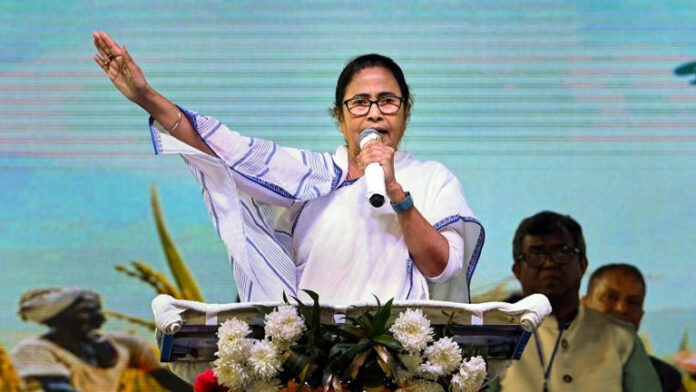West Bengal Chief Minister Mamata Banerjee’s recent decision to go on dharna (sit-in protest) over the issue of pending central dues has once again brought the spotlight on the contentious relationship between state governments and the central authority. In a bold move, Banerjee declared that the state government would ensure the payment of workers’ salaries from state funds, highlighting the urgency of resolving the financial impasse and safeguarding the interests of state employees.
The standoff between the West Bengal government and the central authority stems from the delay in disbursing funds owed to the state under various central schemes and grants. Mamata Banerjee has accused the central government of withholding funds due to the state, leading to severe financial strain and impacting the state’s ability to meet its financial obligations, including the payment of salaries to government employees.
The decision to go on dharna underscores Mamata Banerjee’s determination to hold the central government accountable for its financial commitments to the state. By staging a protest outside the Raj Bhavan, the chief minister sent a strong message to the central authority that the state would not tolerate delays or arbitrary withholding of funds that are essential for its functioning and development.
Banerjee’s assertion that the state government would use its own resources to pay workers’ salaries reflects her commitment to prioritizing the welfare of state employees, who have been adversely affected by the financial standoff. By pledging to cover the salaries from state funds, Banerjee demonstrated her resolve to protect the livelihoods of thousands of workers who rely on timely payment of wages to meet their basic needs.
The dharna also served as a platform for Mamata Banerjee to rally public support and draw attention to the plight of states grappling with financial constraints imposed by the central government. Her vocal criticism of the central authority’s policies and actions resonated with many who share her concerns about the erosion of state autonomy and the unequal distribution of resources between the center and the states.
The standoff between the West Bengal government and the central authority is not an isolated incident but rather symptomatic of broader issues surrounding fiscal federalism and intergovernmental relations in India. States often find themselves at the mercy of the central government when it comes to the allocation of funds and resources, leading to tensions and disputes over financial matters.
Mamata Banerjee’s dharna highlights the need for a more equitable and transparent framework for fiscal transfers between the center and the states, one that ensures timely and adequate allocation of resources to meet the diverse needs of different regions. The central government must recognize the importance of empowering states to manage their finances independently and allocate funds in accordance with their priorities and requirements.
Moreover, Mamata Banerjee’s bold stand underscores the crucial role of state governments in safeguarding the interests of their citizens and advocating for their rights in the face of central authority. By challenging the central government’s decisions and policies, Banerjee has demonstrated her commitment to upholding the principles of federalism and protecting the autonomy of states in India’s democratic framework.
Furthermore, Mamata Banerjee’s decision to take direct action through a dharna underscores the limitations of traditional political channels in resolving complex intergovernmental disputes. In the absence of meaningful dialogue and cooperation between the central and state governments, Banerjee’s protest serves as a powerful reminder of the need for constructive engagement and consensus-building to address issues of fiscal imbalance and resource allocation effectively. By resorting to public protest, Banerjee has brought the issue into the national spotlight, compelling policymakers to confront the underlying issues and work towards a sustainable solution.
Moreover, the ongoing standoff between the West Bengal government and the central authority highlights broader concerns about the erosion of federalism and the concentration of power at the center. As states grapple with increasing financial constraints and limitations on their autonomy, there is a pressing need for a more collaborative and inclusive approach to governance that respects the diverse needs and priorities of different regions. Mamata Banerjee’s dharna serves as a rallying cry for states to assert their rights and demand greater autonomy in decision-making processes, paving the way for a more equitable and decentralized model of governance in India.

